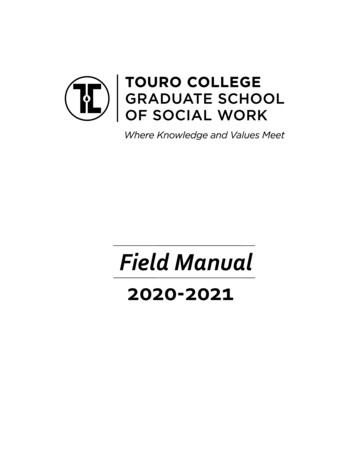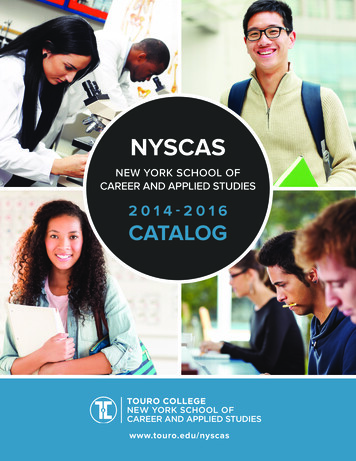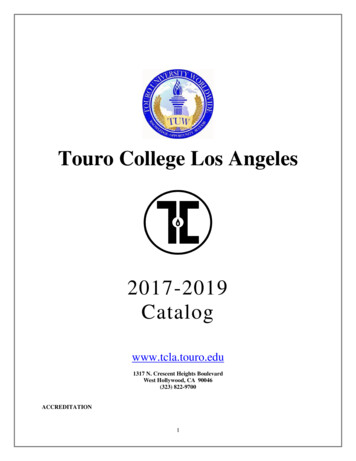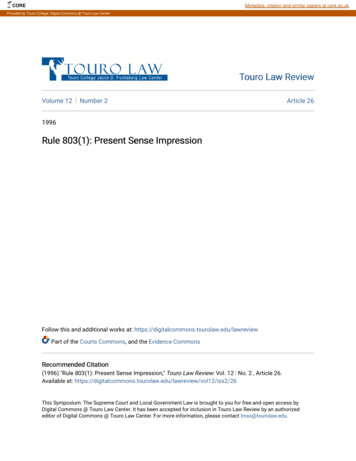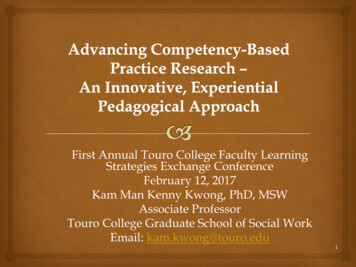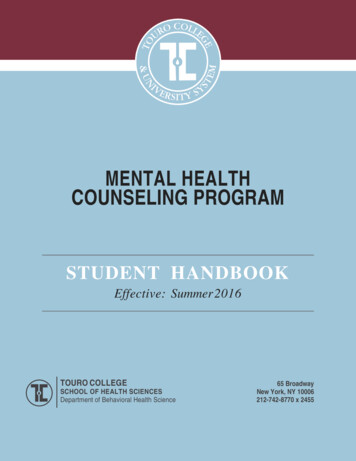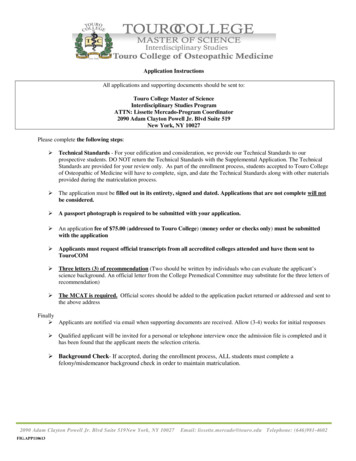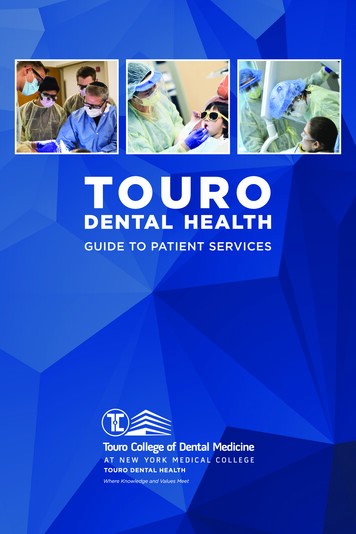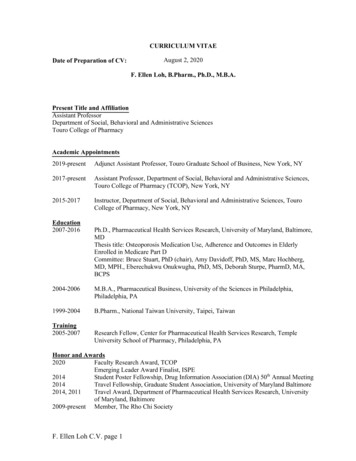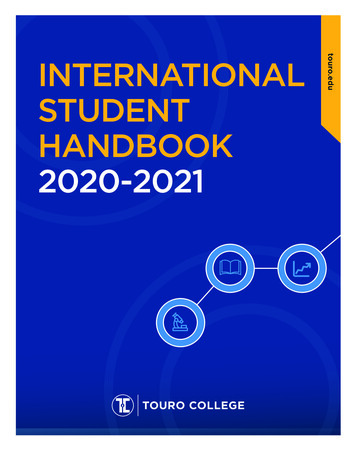
Transcription
TOURO 021
International Student Handbook2020-2021
IMPORTANT NOTICEThis Handbook contains only general guidelines and information. It is not intended to be comprehensive or to addressall the possible applications of, or exceptions to, the policies and procedures of Touro. Some of the subjects describedin this Handbook are covered in detail in official policy and procedure documents found online and elsewhere. Youshould refer to these documents for specific information, since this Handbook only briefly summarizes those policies.For that reason, if you have any questions concerning a particular policy or procedure, you should address yourspecific questions to the Office of Institutional Compliance. Please note that the terms of the full official policies arecontrolling in the case of any inconsistency.This Handbook is neither written nor meant to confer any rights or privileges on students or impose any obligationson Touro. No individual or representative of Touro (except the President) has the authority to enter into any agreementor understanding contrary to the above.This Handbook is written for informational purposes only and may contain errors. The policies, procedures andpractices described herein may be modified, supplemented or discontinued in whole or in part, at any time with orwithout notice. All changes will be posted on the Touro website. Although we will attempt to inform you of any changesas they occur via the Touro email address assigned to you upon activating your TouroOne portal account, it isnevertheless your responsibility to keep current on all College policies, procedures and practices. Your assignedTouro email address is the official method of contact for all such notices and for all Touro communication.Students are required to investigate for themselves as to whether the program they enroll in meets their personal,educational and career needs. Different jurisdictions have different licensing requirements and standards. Whilestudents may expend significant sums associated with higher education, successful completion of a course, program,or degree is dependent on many factors. The payment of tuition permits a student to register and take the courses andprograms available and offered by the Touro school or program in which the student is enrolled. Acceptance in aschool or program does not form the basis of a contract. Indeed a student’s acceptance may be revoked if it is laterlearned, among other things, that his or her qualifications have been misstated or overstated, or there is some otheromission or misrepresentation. Except as noted in the paragraph below, no contract rights exist or are established inthe student- educational institution setting by and between Touro and the student. To this end, you waive and Tourodisclaims any contract or liability for promises, assurances, representations, warrantees, or other statements made inits marketing or promotional materials, and makes absolutely no promises, assurances, representations, guarantees,warrantees or other statements concerning our courses and programs and a student's academic success in them. Thus,you waive and Touro further disclaims any liability in tort in connection with any of the foregoing. In order for adegree to be earned, the required grades and grade point averages must be achieved and maintained, and all otherrequirements of the school and program must be fulfilled. These disclaimers are, in effect, covenants not to sue bindingon students, and are tacitly agreed to by a student’s matriculation or continued matriculation in our programs.Registration and matriculation at Touro after the issuance of this Handbook is consideration for and constitutes astudent's knowing acceptance of the binding Alternative Dispute Resolution ("ADR") mechanisms contained herein.Thus, any dispute, claim or controversy arising out of or related to your application, registration, matriculation,graduation or other separation from Touro and/or this Handbook, which is not resolved through Touro's internalmechanism shall be submitted to non-binding mediation with a neutral mediator affiliated with an established andreputable organization engaged in alternative dispute resolution (“ADR Organization”). In accordance with theFederal Arbitration Act and to the extent not inconsistent with the primacy of federal law, all Disputes remaining aftercompletion of the mediation shall be exclusively conducted and heard by an ADR Organization, designated by Touroin its sole and absolute discretion, before a single arbitrator who shall be an attorney. The location of the arbitrationshall be at a convenient office on a Touro campus where the student is (or was last) affiliated. See the “AlternativeDispute Resolution" provision on pp. 17-18 for a more elaborate treatment.1
General DisclaimerThe Touro College and University System endeavors to provide ongoing and uninterrupted educational experiencesin a safe and effective environment for our students, staff and faculty. Given the dynamic circumstances surroundingCOVID-19 and any other future unknown or unforeseen events and the uncertainties that may be attendant thereto,Touro may be obligated or otherwise compelled to change the method of course delivery and other relevant policiesat any time. Any changes will be communicated in a timely manner and can be found on Touro’s website.COVID-19The COVID-19 global pandemic, which has caused a disruption to all higher education institutions and has forcedTouro to move temporarily to an online modality, has affected some of our policies and procedures. While we willcontinue to operate with the same policies that we had prior to the pandemic, slight procedural modifications may beneeded. We ask that you please stay in contact with your Program administration, faculty and student services staffand remain current with any guidance issued in response to the COVID-19 pandemic.COVID-19 Related Clinical ProceduresCertain Touro College programs have clinical/course requirements and sequencing. While each of these programsstrives to adhere to its established timing of courses and clinical experiences, unforeseen events may hamper theiravailability. When such situation occurs, it is possible that the completion of that program may be delayed and thetime in the Program extended to meet accreditation requirements. Furthermore, once appropriate clinical experienceshave been arranged, it is up to the student, not the affected program, to decide whether to attend the clinical site.Should a student decline to participate, the student understands that their progression in that program may bedelayed. Students declining to participate in clinical or other experiential components of such programs should contacttheir clinical coordinator to ensure graduation requirements are met as well as that other rules and regulations aresatisfied.Important COVID-19 Information for International StudentsTemporary COVID-19 Restrictions on U.S. Visa and Entry General Suspension of Routine Visa ServicesOn March 20, 2020, the Department of State suspended routine visa services at all U.S. Embassies and Consulates.More information regarding the suspension of routine visa services can be found at the U.S. Department of Statewebsite. Students should contact the U.S. Embassies and Consulates in their countries to seek guidance regardingfuture F-1 and J-1 visa appointments. Travel Related Proclamations on Nonimmigrants to the U.S.COVID-19 Presidential Proclamation United States entry bans are currently in effect as of June 2020, until terminatedby the President. They affect the entry of international students and other nonimmigrants into the U.S. from certaincountries. The current proclamations include China Travel Proclamation, Iran Travel Proclamation, EuropeanSchengen Area Proclamation, Ireland and United Kingdom Proclamation, and Brazil (Proclamation 10041 of May 24,2020).The Touro College International Students’ Office will endeavor to provide updates to international students as therules and regulations change. Please contact the Office of International and Veteran Student Affairs if you have anyquestions.Additionally, it is understood that Touro cannot make any guarantees with regard to a student’s eligibility to travel tothe United States or obtain a Visa for educational or employment opportunities. Students are exclusively responsiblefor researching the relevant guidelines for maintaining their Visa status and making appropriate travel arrangementsto enter the United States.2
ABOUT THE TOURO COLLEGE AND UNIVERSITY SYSTEMTouro is a system of non-profit institutions of higher and professional education. Touro College was chartered in1970 primarily to enrich the Jewish heritage, and to serve the larger American and global community.Approximately 19,000 students are currently enrolled in its various schools and divisions. Touro College has 30campuses and locations in New York, California, Illinois, Berlin, Jerusalem, and Moscow. New York MedicalCollege; Touro University California and its Nevada branch campus; Touro University Worldwide and its TouroCollege Los Angeles division; as well as Hebrew Theological College in Skokie, Ill. are separately accreditedinstitutions within the Touro College and University System. For further information on Touro College, pleasego to: http://www.touro.edu/news/.ACCREDITATIONTouro College was chartered by the Board of Regents of the State of New York in June 1970. Touro College isaccredited by the Middle States Commission on Higher Education (MSCHE), 3624 Market Street, Philadelphia,PA 19104, 267-284-5000. The Middle States Commission on Higher Education is an institutional accreditingagency recognized by the United States Secretary of Education and the Council for Higher EducationAccreditation. This accreditation status covers Touro College and its branch campuses, locations, andinstructional sites in the New York area, as well as branch campuses in Illinois, Berlin, Jerusalem, and Moscow.Touro University California (TUC) and its branch campus Touro University Nevada (TUN), as well as TouroUniversity Worldwide (TUW) and its division Touro College Los Angeles (TCLA), are part of the TouroCollege and University System, and separately accredited by the Western Association of Schools andColleges Senior College and University Commission (WSCUC), 985 Atlantic Avenue, Alameda, CA 94501(Tel: 510-748-9001).New York Medical College (NYMC) is a separately accredited institution within the Touro College andUniversity System, also accredited by the Middle States Commission on Higher Education (MSCHE).The Hebrew Theological College (HTC) in Skokie, IL, is also a part of the Touro College and University System.HTC is accredited by the Higher Learning Commission (HLC).POLICY OF NON-DISCRIMINATIONTouro College is an equal opportunity employer. Touro College treats all employees, job applicants, andstudents without unlawful consideration of race, ethnicity, religious creed, color, national origin,ancestry, sex (including pregnancy, childbirth or related medical condition), age, disability, medicalcondition, marital status, genetic information, sexual orientation, gender, gender identity, military service orveteran status, citizenship status, or any other classification protected by applicable federal, state, or locallaws. We are committed to ensuring the fulfillment of this policy in all decisions, including but not limitedto, recruitment, the administration of educational programs and activities, hiring, compensation, trainingand apprenticeship, placement, promotion, upgrading, demotion, downgrading, transfer, layoff, suspension,expulsion and termination, and all other terms and conditions of admission, matriculation, andemployment.For the full policy statement see https://www.touro.edu/non-discrimination/.3
INTRODUCTIONTO THE READER:This Handbook contains a wealth of valuable information that pertains to you as an international student.In addition, you are responsible for familiarizing yourself with policies, procedures, rules, and regulationsthat pertain to all Touro College students. These are available on the Touro website athttps://www.touro.edu/students/ under “Policies” and in the catalog and/or handbook of the Touro schoolor program in which you are enrolled, listed under “College Catalogs” on that page.Touro students hail from all over the world, from all walks of life, in the pursuit of a common goal: To get afirst-rate education, to find a promising professional career, and to do so in an environment that respects andsupports their backgrounds and beliefs.What sets Touro apart is not simply our top-notch programs, engaged faculty members, or experientiallearning opportunities. It’s our culture and curriculum that respect your commitments – to your community,your values, and your future.Originally established in 1970 to focus on higher education for the Jewish community and underservedpopulations, we’ve grown to serve an extraordinarily diverse student body of over 19, 000, spread across 30schools in 4 countries. We are uniquely attuned to the importance of an education that accommodatesstudents from all backgrounds and circumstances.Like many students who came before you, knowing what to expect as a Touro international student living inNew York City will help you get the most out of your stay. This Touro International Student Handbook isintended to do just that.The Touro International Student Handbook will provide information that can assist you in making an easytransition into American culture. In general, it will help you adapt to academic and student life in a U.S.college environment and to be mindful of requirements pertinent to international students. More specifically,it will help you understand how to obtain and maintain your student visa and immigration status.The Handbook will also inform you about possible employment options and life in New York City, and help youunderstand your relationship with various federal agencies. Equally important, it is a useful resource forunderstanding new terminology.For detailed information about specific topics, you may check the web links provided throughout varioussections of this Handbook. You may also contact the offices of the dean or program director at the TouroCollege school you plan to attend.4
International Student Services (in the Office of the Registrar)320 W 31st St. Rm. 134, New York, NY 10001Principal Designated School Official (PDSO): Ms. Sun Hee ChoiPhone: 212-463-0400 ext 55607Email: sun.choi3@touro.eduDesignated School Official (DSO): Mr. John MartinezPhone: 212-463-0400 ext 55391Email: john.martinez@touro.eduDesignated School Official (DSO): Dr. Susan ThompsonPhone: 631-761-7012Email: susant@tourolaw.eduDesignated School Official (DSO): Ms. Paula KutchPhone: 631-761-7040Email: paulak@tourolaw.eduInternational AdmissionsFor Undergraduate Schools and Professional Schools: Ms. Lita CabezasPhone: 212-463-0400 ext 55644Email: lita.cabezas@touro.eduFor Graduate Schools: Ms. Sharmilee HoopnarinePhone: 212-463-0400 ext 55119Email: sharmilee.hoopnarine@touro.eduFor the Law Center: Dr. Susan ThompsonPhone: 631-761-7012Email: susant@tourolaw.eduRegistrar’s OfficeThe Office of the Registrar is responsible for maintaining student information and records, such as dates ofenrollment, courses taken, and grades earned. If you change your name or local address while studying atTouro, it is important to notify your school’s Registrar’s Office about the change.Office of the Registrar320 W 31st St. Rm 131New York, NY 10001All inquiries regarding admissions, registration, and billing can be made to the TouroOne Nonstop Helpdeskby calling 844-868-7666 or emailing nonstop@touro.edu5
OBTAINING A VISA & IMMIGRATION STATUSThis section covers the information, process and forms needed to obtain the F-1 immigration status; alsofrequently referred to as F-1 status (F status).The F-1 visa allows you to legally enter the U.S. as a student. The F immigration status on the other handallows you to legally stay in the U.S. for the duration of your studies.Most international students come to the U.S. as F-1 students. They either, financially support themselves,and/or are financially sponsored by family or friends. The U.S. Department of Homeland Security regulates theissuance of all non-immigrant visas, including the F-1.The U.S. Citizenship and Immigration Service (USCIS) is the agency under the U.S. Department of HomelandSecurity (DHS) that regulates all immigration laws, standards, practices and procedures, including F-1immigration status.Touro College schools, and often individual programs, have specific application criteria. For details on how toapply, please go to www.apply.touro.edu, then sign in and create an account. With your application, you maysubmit the necessary forms to apply for the F-1 visa and, consequently, obtain your F immigration status.Step 1: Complete (where applicable) and submit copies of these required documents:1. Acceptance Letter2. Immunization form: Proof of immunization against mumps, measles and rubella (MMR) and Meningitisis needed before you can register for courses. Therefore, you will need to submit this immunizationform, along with any other pertinent health records. This information is needed to determine if youhave the mandatory health immunizations as required by the U.S. government.3. Proof of Financial Support demonstrating your ability to support yourself during the entire period ofstudy in the U.S. If you have a sponsor who will be providing funds, a notarized “Affidavit of Support”is required.4. Proof of English Proficiency: As an international student, you are required to submit proof of Englishproficiency that is required by your program.5. Copy of ID page of Passport (including photo)6. Permanent address and mailing address informationWhen completing the finance forms, remember to remind your bank to convert all figures into U.S. dollars,and attach all necessary documents (e.g. bank letter/statement, sponsor’s proof of income, proof of anapproved loan or evidence of a scholarship) before returning them to your DSO or international studentadvisor. Please attach documents that are original and translated into English.Please submit these documents, either by regular mail or as attachments to an email, to your internationalstudent admissions counselor6
Step 2: I-20Form I-20 is a very important document. It is needed to obtain the F visa, and must be duly updated to reflectyour F immigration status in the U.S.In addition, the Designated School Official (DSO) is charged with entering the information listed on theseforms in the DHS database known as SEVIS: Student & Exchange Visitor Information System. The information isviewed by Department of State officials at the U.S. Consulate when you go to apply for an F-1 Student Visa.After the College has determined that you have provided the required information, including evidence ofsufficient funds to support your education and living expenses, the DSO will mail your Form I-20 to you.This Form I-20 will be reviewed and verified by a U.S. Customs and Border Protection (CBP) Officer when youenter the U.S.Step 3: Letter Accompanying the I-20You will receive instructions from your DSO on how to apply for your F visa, how to obtain your F immigrationstatus, and what you must do after you arrive. Carefully review this letter upon receipt and before you applyfor the F-1 visa.Step 4: SEVIS Fee & Payment ReceiptAs a new applicant, you must pay a one-time I-901 SEVIS fee for the F-1 visa to the U.S. Department ofHomeland Security before you can apply for a visa. You will need the SEVIS fee payment receipt in order toapply for your visa at the U.S. Consulate in your home country. This fee is not required for F-2 dependents.You must pay the SEVIS fee in U.S. dollars, either online (using a credit card) or through the mail (by U.S.check, money order, or bank draft). Once payment is received, it takes three business days to be processed.This means that your payment must be received at least three days before you apply for a visa at the U.S.Consulate in your country (or at least three days before your entry into the U.S. if you are a Canadian citizen).You must have your I-20 form before you can pay the SEVIS fee. After receiving a Form I-20, you will need toknow your SEVIS identification number. The SEVIS identification number is printed in the upper right sectionof the I-20. The Touro SEVIS school code can be found on your I-20. Detailed information and instructions onpaying the fee can be accessed at https://www.fmjfee.com/i901fee/Step 5: Consulate AppointmentOnce you have received your I-20 and your SEVIS fee payment receipt, make an appointment at the U.S.Consulate or embassy in your home country to apply for the visa: http://usembassy.state.govWhile Consulate procedures for the F-1 visa may differ from country to country, the application processusually includes a short interview in English, several forms that you need to complete, and a processing fee.When you go to the U.S. Consulate, you must bring originals of all required documents for your F-1 visaapplication. Your passport must be valid for at least six months from the date of your appointment at theConsulate.When your application is approved, an F-1 visa stamp will be added to your passport.7
Step 6: U.S. EntryAfter receiving your F-1 visa, you will be ready to enter the U.S. within 30 days of school start date listed onyour Form I-20 and receive your corresponding F 1 immigration status upon arrival in the U.S.Please note, that when you enter the U.S., you may be subject to various security checks, including, beingphotographed and electronically fingerprinted. This is a routine procedure for anyone entering the U.S. witha visa and is part of the safety measures taken by the U.S. Department of Homeland Security (DHS).DHS regulations require that you enter the U.S. based on the Form I-20 from Touro College or any other U.S.college that you plan to attend. If you do not do so, it is a violation of F-1 immigration laws and can result inloss of your student immigration status.Step 7: Report to Your CollegeIt is extremely important that you safeguard your I-20 form, and do not lose it. Your Form I-20, passport withvalid F-1 visa stamp, and Form I-94 are critical to maintaining your status. The I-94 Form is a confirmation ofyour lawful entry into the U.S. You will be able to download and print a copy of this form by following theinstructions at https://i94.cbp.dhs.gov/I94/.Upon arriving in the U.S., you must report to a P/DSO at your local campus or the main campus at 320 W 31stStreet, Rm 134, New York, NY 10001.A P/DSO at your campus will validate your F status in SEVIS. To do so, you must provide him/her with thefollowing original documents: passport, Form I-20, printout of your I-94, and proof of your US address. TheP/DSO will make copies of these documents and maintain them for mandatory record-keeping purposes. Youare required to begin classes on your official start date on I-20.Failure to report to the college that issued the I-20 upon your U.S. arrival is a USCIS violation and can alsoresult in loss of your student immigration status.International Student Orientation/ Information Session: All new international students are required toattend the International Student Information Session. You will learn about important SEVIS regulations, F1visa laws, and school resources that directly impact your life as an international student in the U.S.Student Orientation: It is important that you participate in the new-student orientation programs offered byyour school or program. The dean or program director will provide you with orientation information pertinentto you. Orientations are held at the start of each semester, and offer valuable information that will help youunderstand the requirements for maintaining your F status. They also provide you with student lifeinformation that will help you adjust to your new environment and learn more about your academicrequirements.8
MAINTAINING YOUR IMMIGRATION STATUSOne of the most important responsibilities you will have during your studies at Touro College is to maintainyour immigration status. This section will assist you in doing that.Remember, immigration status is often referred to as just “status.” Maintaining your status is often referred toas “being in status,” which means that you have fulfilled all U.S. F-1 requirements and regulations andfollowed all procedures.If you fail to adhere to any F regulations, you could lose your status, be required to leave the U.S., and bedenied re-entry. Therefore, it’s very important that you meet with your DSO at least once a semester orwhenever there’s a qualifying event such as a change of address, international travel, medical emergency,or anything that will cause you to attend classes on less than a full time basis.Also, keep in mind that immigration laws often change. Your DSO will keep you informed. In addition, youshould also check The Department of Homeland Security website http://www.ice.gov/sevis/index.htmfrom time to time for any updates.RULES FOR MAINTAINING YOUR STATUS:Rule #1: Remain a Full-Time StudentYou must remain a full-time student each fall and spring semester. Failure to enroll as a full-time student –registered for at least 12 credits if an undergraduate or 9 credits if a graduate student – is a violation of yourimmigration status. Please note: If a summer session is to be your first semester at Touro, you must also beenrolled full-time.At Touro College, the number of credits required for a graduate level, doctoral or law student to be full-timecan vary depending on the school or program in which the student is enrolled. Please check with the dean oradvisor at your school or program to confirm the number of credits you must take each semester to satisfyyour full-time status requirement.Rule #2: Keep Your Documents ValidTo maintain your immigration status, you must make sure that your passport, and I-20 remain valid all thetime. Your visa needs to be valid each time you enter the U.S. Your I-20 will include an anticipated completiondate for your studies in the U.S. This date is listed on the I-20. Most students complete their programs in theperiod of time noted on their I-20, but occasionally students need an additional semester or more to completetheir program. You must consult your DSO if you need additional time to complete your program, at least60 days before the completion date listed on your I-20. Once your completion date passes, your I-20 willexpire and you may not be able to extend your stay in the U.S.To make sure you keep your passport valid at all times, contact your country’s consulate in New York City oryour embassy in Washington D.C. for renewal procedures.9
Make sure that your passport is valid for at least six months from the day you plan to reenter the U.S. Youcannot (may not) enter the U.S. on the F-1 visa, using a passport that is less than six months fromexpiration.You will always need to maintain a valid F visa in order to re-enter the U.S. Check the expiration date on yourvisa to see when you will need to renew it. Remember, you can only renew it at the U.S. Consulate in yourhome country. You cannot obtain or renew the visa in the U.S. Know that if your visa expires while you are inthe U.S., you do not have to renew it until you leave the U.S. for a vacation in your home country.If you have a valid visa in an expired passport, always present both, the old and new passport to the U.S.Customs and Border Protection (CBP) Officer when you re-enter the U.S.Rule #3: Obtain Travel Authorization to Re-Enter the U.S.Meet with your DSO before you leave the U.S. to obtain travel authorization to re-enter the U.S.If you plan on traveling outside the U.S. during your studies, you must have your I-20 signed by your DSObefore you leave. The DSO’s travel signature is valid only for one year.If you do not have a current signature on your I-20, you will have difficulty re-entering the U.S. You shouldvisit your DSO with your passport that has a valid F-1 visa stamp and I-20, at least three weeks beforetraveling.Rule #4: Keep Your DSO Informed1. Changes in Personal Information: Notify your DSO and update the changes under your Touro Oneaccount within 10 days of any changes in your: Phone number Address Email address Name Marital status Immigration statusYour DSO will make the necessary updates to your records in SEVIS. Failure to report changes in yourpersonal information within 10 days of their occurrence can place you in danger of losing yourstudent immigration status.2. Departure from College: Contact your DSO if you plan to leave your school or program temporarily orpermanently. Whether you plan to study outside the U.S., take a leave of absence, withdraw, graduateearly, or transfer to another school, you must notify your DSO before leaving. There is also a timelimit for remaining in the U.S. after you complete your program of study.3. Missing Documents: Contact your DSO immediately if any of your documents are lost or stolen. YourDSO will let you know how to obtain replacement documents. Note: You must always report a lostpassport to your local police precinct and obtain a police report with a case number.10
Rule #5: Do Not Work Without AuthorizationInternational students are only permitted to work outside their colleges with permission from either their DSOor the U.S. Citizenship and Immigration Services (USCIS). Working without authorization is a deportableoffense. Do not accept any employment unless you have written work authorization. For more information onhow to obtain legal employment, see “Understanding Employment Options,” below.UNDERSTANDING EMPLOYMENT OPTIONSAs an international student, federal law lim
University Worldwide (TUW) and its division Touro College Los Angeles (TCLA), are part of the Touro College and University System, and separately accredited by the Western Association of Schools and Colleges Senior College and University Commission (WSCUC), 985 Atlantic Avenue, Alameda, CA 94501 (Tel: 510-748-9001).
